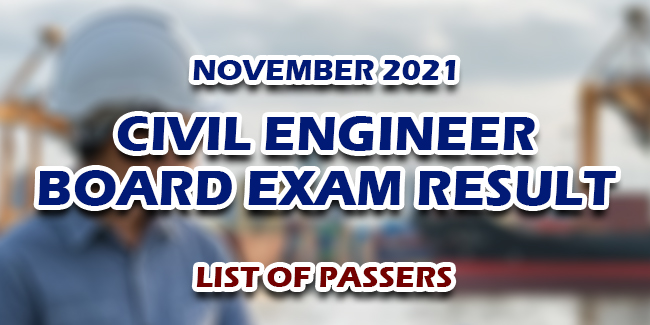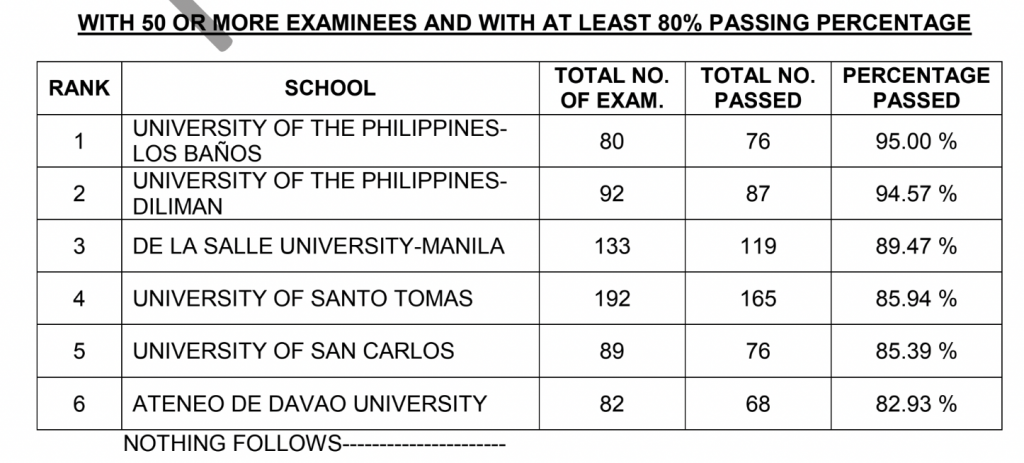The wait is finally over for thousands of aspiring civil engineers who took the November 2023 Civil Engineering Board Exam! The Professional Regulation Commission (PRC) has officially released the results, a moment of anticipation and nervous excitement for those who have poured their hearts and minds into preparation. But where can you find this valuable information, and what does it mean for your future? This article will guide you through the ins and outs of accessing the November 2023 civil engineering board exam results, interpreting the data, and understanding the next steps in your journey towards becoming a licensed professional.

Image: newspapers.ph
The Civil Engineering Board Exam is considered a crucial stepping stone towards a successful career in the field. It is a rigorous assessment designed to ensure that aspiring engineers possess the necessary knowledge, skills, and ethical standards to practice safely and contribute meaningfully to the construction and infrastructure landscape. This examination is not just about passing a test; it’s about demonstrating your mastery of the theoretical and practical principles that underpin the entire profession.
Obtaining the November 2023 Civil Engineering Board Exam Results
1. Official PRC Website: Your First Stop
The primary and most reliable source for the civil engineering board exam results is the official website of the Professional Regulation Commission (PRC). Head over to prc.gov.ph to access the latest announcements and download the official PDF document containing the complete list of passers.
2. Searching for Your Name
The PDF document typically outlines the results in a well-structured table. You can find your name by navigating through the list, sorted by examinee number, name, and examination rating. Be patient as the file size may be large and require some time to download. Remember, you can always press “Ctrl + F” on your keyboard and enter your full name or examinee number to jump directly to your result.

Image: prcboard.com
3. Downloading and Saving the Results
Once you have found your results, save the official PDF file for your records. This serves as crucial proof of your passing status and can be used for future verification purposes. It’s always a good practice to have multiple backups just in case!
Understanding the Results
1. The Passing Rate
The passing rate is a key indicator of the overall performance of the examinees. It is calculated as the percentage of examinees who achieved the minimum passing score set by the PRC. Typically, a passing rate of around 50% or higher is considered a positive sign for the profession. A lower passing rate may suggest the need for adjustments to exam content or preparation strategies.
2. Your Rating
Your rating reflects your individual performance on the exam. It is calculated as the average of your scores across all subjects. The minimum passing score, which is set by the PRC annually, is usually above 70%. If your rating is above the minimum passing score, congratulations! You have successfully cleared the exam and are now a registered professional engineer.
3. Subjects and Scores
The civil engineering board exam typically covers a wide range of subjects, including:
- Mathematics
- Survey and Geodesy
- Hydraulics and Hydraulic Structures
- Structural Engineering
- Construction Engineering
- Transportation Engineering
- Soil Mechanics
- Engineering Geology
- Engineering Laws and Ethics
- Environmental Engineering
The results document will likely display your individual scores for each subject. This allows you to identify your strengths and areas where you might need further improvement if you are planning on taking the exam again.
Next Steps for Successful Candidates
1. Registration and Oath-Taking
Now that you’ve cleared the exam, the next milestone is registration with the Professional Regulation Commission (PRC). This involves submitting the required documents and paying the necessary fees. The PRC will then schedule an oath-taking ceremony for all the successful examinees. This ceremony marks the official entry into the civil engineering profession and is a significant event for all new professionals.
2. Building Your Career
With your license in hand, you are now ready to embark on an exciting career as a civil engineer. The field offers diverse opportunities in areas like:
- Construction projects: From residential buildings to massive infrastructure projects, civil engineers play a vital role in the design, construction, and maintenance of various structures.
- Infrastructure planning and development: Help shape the urban landscape by working on city planning, transportation systems, water management, and waste disposal.
- Research and development: Contribute to innovation in the field by conducting research on new materials, construction techniques, and sustainable engineering solutions.
- Government agencies: Work with government organizations on infrastructure planning, regulatory oversight, and policy development.
- Consultancy: Offer expert advice and solutions to clients on various engineering projects.
3. Continuous Learning and Development
The world of civil engineering is constantly evolving. New technologies, materials, and construction methodologies are emerging regularly. It is essential to stay updated by participating in professional development activities, attending workshops and seminars, and reading industry publications.
Resources for Civil Engineers
There are numerous resources available for civil engineers at various stages of their career:
- Professional organizations: Join professional organizations like the Philippine Institute of Civil Engineers (PICE) to connect with other professionals, attend events, and access valuable resources.
- Online learning platforms: Explore online platforms like Coursera, Udemy, and edX for courses and certifications related to civil engineering. These courses can help you enhance your knowledge and gain specialized skills.
- Industry publications: Stay informed about the latest trends, research findings, and industry news by reading publications such as the ASCE Journal of Engineering Mechanics and the Structural Engineer.
- Government resources: The Department of Public Works and Highways (DPWH) website and the PRC website offer valuable information on regulations, guidelines, and opportunities for civil engineers.
Civil Engineering Board Exam Result November 2023 Pdf
Conclusion
The November 2023 Civil Engineering Board Exam results have been released, marking a significant milestone for aspiring professionals. Whether you have successfully passed the exam or are considering a retake, remember that the journey of becoming a successful civil engineer is a continuous learning process. With dedication, hard work, and a commitment to staying updated, you can make a meaningful contribution to the construction and infrastructure landscape. Congratulations to all the successful candidates, and best wishes to those who are still on their path towards licensure. The future of our nation’s infrastructure relies on skilled and dedicated civil engineers like you!






